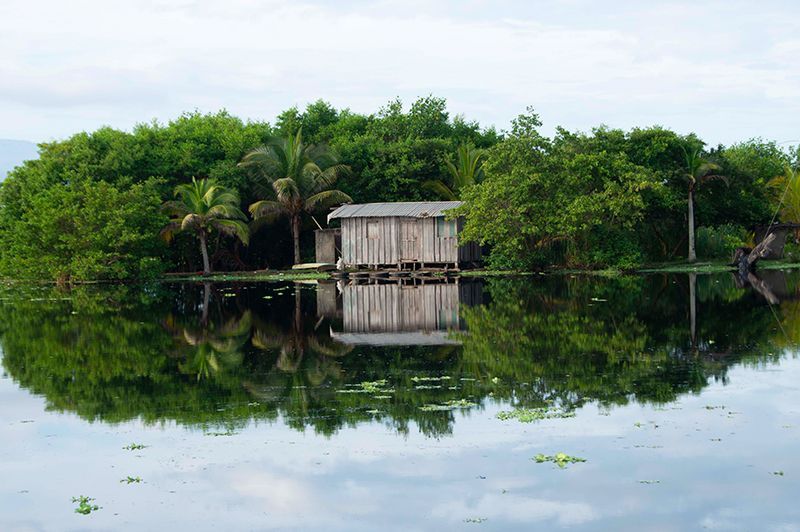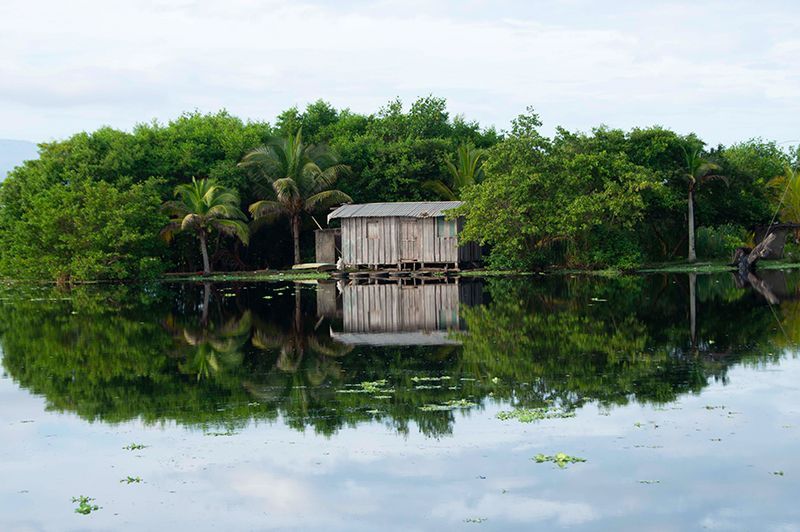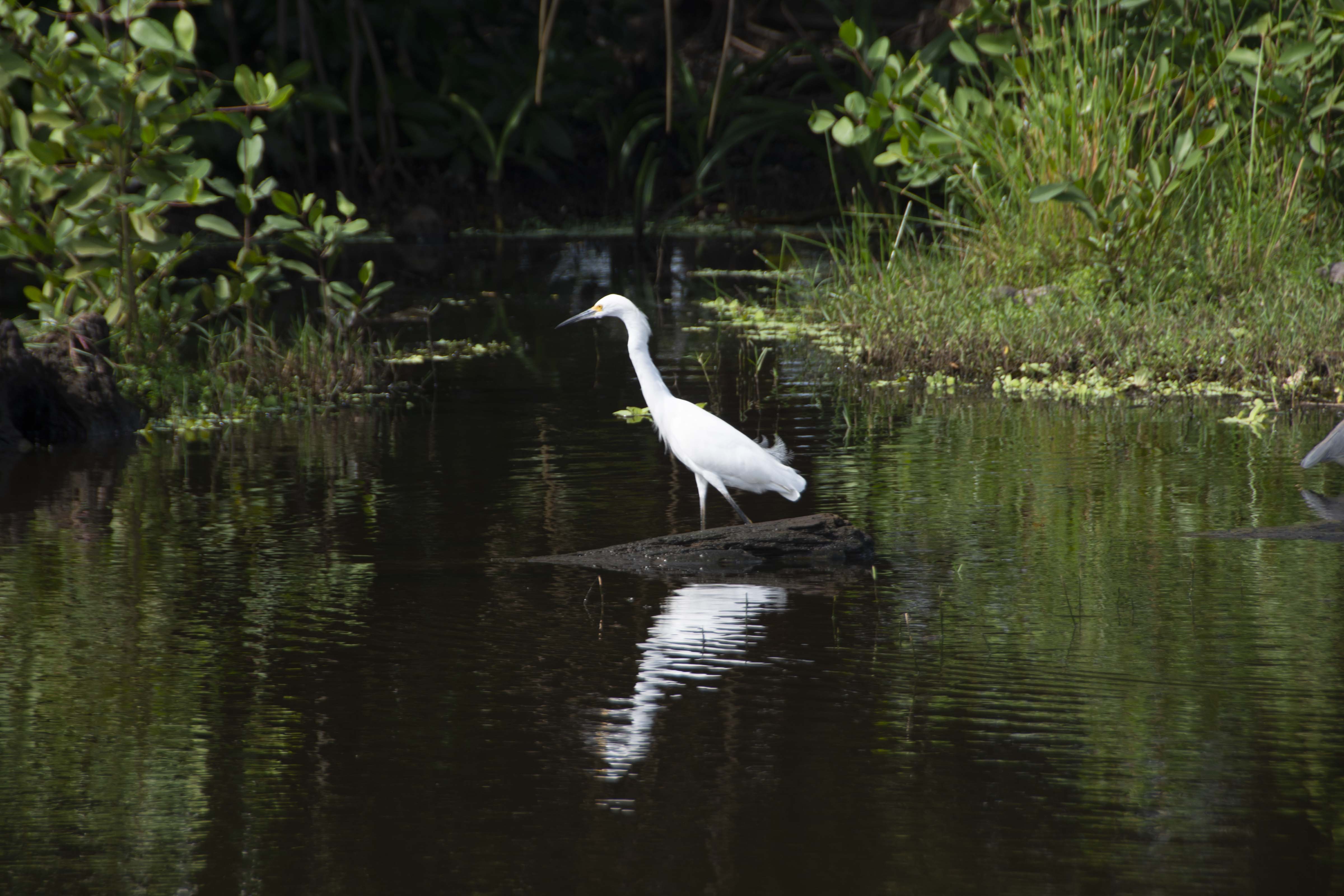Through reforestation activities, the Forests, Biodiversity and Community Development project, together with various local communities, seeks the recovery of this species.
|
Photo: Mario Rubio Balcárcel |
| Mangrove forests are allies for the sustainable development of communities |
Department of Izabal, Guatemala, July 24, 2020. Every day, fishermen in Izabal, a department located on the Atlantic coast of Guatemala, watch with concern as the mangrove forests become extinct. The anguish takes hold of them, because the mangroves - areas where these forests grow - allow the proliferation of maritime diversity that makes artisanal fishing possible, an activity that could disappear, and that has benefitted several generations.
Deforestation could gradually wipe out the mangrove - a species that is a refuge for birds, mammals, and fish - and that also generates a natural paradise landscape. This species of tree is used as wood to build houses or to develop private tourism ventures, activities that increase with the passage of time.
Jeff Taqué, an environmental management engineer, explains that mangroves grow on the banks of rivers and keep part of their trunks and roots underwater. He adds that the mangroves are more important in Izabal because they protect the coast from the tides, and they represent a barrier against hurricanes and flooding. "Efforts are being made to preserve this species through reforestation in areas that were affected," adds engineer Taqué, who is conducting a study on mangroves under the framework of the Forests, Biodiversity and Community Development project, which is financed by the European Union through the EUROCLIMA+ programme.
“The people have understood that without the existence of the mangrove it is impossible to complete the cycle of nature.”
|
Photo: Mario Rubio Balcárcel |
| Mangroves are home to many species of animals, which depend directly on this ecosystem to survive |
According to engineer Taqué," the fish are born in the waters of this tree and later migrate to the sea, where they are caught to be marketed. If the mangrove disappears, this cycle is interrupted, directly affecting fishing activity on a larger scale, on which 70% of the economic income in the communities depends".
Since 2019, the Forests, Biodiversity and Community Development project has been involved in the mangrove reforestation programme in the villages of Livingston and Puerto Barrios located in Izabal. Since then a Mangrove Table has been established through which community leaders and fishermen, share their concerns and solutions regarding this species.
The reforestation processes in these communities are carried out in two ways:
- Through direct planting of the mangrove on the land to be reforested. They use bamboo canes as a base to place the mangrove plants, ensuring that this species grows in its natural habitat and thus adapts better. This process has been successful, but is still in the experimental stage.
- Through nurseries, where the mangrove trees are grown, and then reforested directly in the mangroves. This method has had little success because the survival of the species is low.
Contributing to the recovery of mangrove forests is important since, according to the United Nations Environment Programme, they allow the capture of approximately 2.8 million tons of carbon dioxide each year. The project is currently preparing a report on the existence of this species in Izabal, focusing on the Río Sarstún Multiple Use Protected Area. It is intended to be extended to the protected areas of Rio Dulce National Park, Salvador Lagunita and Cayo Quemado.
The project is also conducting a multi-temporal study of the mangrove ecosystem and has been able to obtain information on the behaviour of the species. To date, 1169 hectares of mangrove have been identified in the Río Dulce (Izabal) area where work is underway to update the data that will be delivered in the coming months. Thanks to this, they are contributing to confronting climate change while also improving the quality of life of the inhabitants by providing economic income through fishing, and they find in the mangrove one of their best allies.
DATA
- The main mangrove species affected are the Red Mangrove (Rhizophora mangle); the White Mangrove (Laguncularia racemosa); the Buttercup (Conocarpus erectus) and the Black Mangrove or Mother Salt (Avicennia germinans).
- The project "Forests, Biodiversity and Community Development" is part of the Forests, Biodiversity and Ecosystems sector of the EUROCLIMA+ programme, implemented by the EF and GIZ agencies. Learn more about the project here.
About EUROCLIMA+
EUROCLIMA+ is a programme financed by the European Union and co-financed by the Federal Government of Germany through the Federal Ministry for Economic Cooperation and Development (BMZ), as well as by the governments of France and Spain. It aims to reduce the impact of climate change and its effects in 18 Latin American and Caribbean countries by promoting climate change mitigation and adaptation, resilience, and investment. The Programme is implemented under the synergistic work of seven agencies: the Spanish Agency for International Development Cooperation (AECID), the French Development Agency (AFD), the Economic Commission for Latin America and the Caribbean (ECLAC), Expertise France (EF), the International and Ibero-American Foundation for Administration and Public Policy (FIIAPP), the German Society for International Cooperation (GIZ), and UN Environment.
Contact for more information: This email address is being protected from spambots. You need JavaScript enabled to view it.






